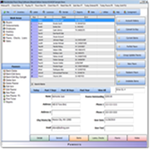Top Shop Management Softwares
Shop Management software plays a crucial role in streamlining retail operations. It provides tools that help manage inventory, track sales, and enhance customer service. With this software, businesses can improve efficiency by automating daily tasks and reducing manual errors. It serves as a central hub for managing everything from employee schedules to financial transactions. By integrating diver... Read More
11 companies found
Product Description
PPSS software is designed to solve practical problems that many businesses face today. At its core, PPSS is all about providing a straightforward, user-friendly solution for task management and collaboration. Whether you run a small startup or a large corporation, keeping everyone on the same page and managing workloads can be a challenge. This is where PPSS steps in to simplify the process. Imag... Read More
Users
- • No Data
Industries
- • No Data
Market Segment
- • No Data
Product Description
Moneywell is a software designed specifically for small business owners and individuals who want to streamline their financial management in an easy and intuitive way. If you ever feel overwhelmed by budgets or managing your expenses, Moneywell can simplify it for you. This tool helps you track your income and spending with minimal effort. It's built to be user-friendly, so you don’t need an acc... Read More
Users
- • No Data
Industries
- • No Data
Market Segment
- • No Data
Product Description
FinAcc is designed for small and mid-sized businesses to manage their financial activities easily and efficiently. Whether you're juggling daily expenses, monitoring cash flows, or generating financial reports, FinAcc simplifies these crucial tasks, allowing your team to focus on growth and strategy. Imagine a system where all your financial data is stored in one secure place, accessible from any... Read More
Users
- • No Data
Industries
- • No Data
Market Segment
- • No Data
Product Description
PawnSnap is a user-friendly software designed specifically for pawn shops to streamline their operations and enhance customer service. This software integrates a range of features that allow pawnbrokers to manage their inventory, sales, and customer interactions efficiently—all from one platform. At its core, PawnSnap provides an intuitive interface that makes it straightforward for staff with va... Read More
Users
- • No Data
Industries
- • No Data
Market Segment
- • No Data
HI-Tech Pawn
Product Description
HI-Tech Pawn is designed specifically for pawn shops looking to modernize and simplify their daily operations. It's a solution created with the needs of small and medium-sized businesses in mind, helping them manage everything from inventory and transactions to customer relationships and compliance. With HI-Tech Pawn, you can easily keep track of all the items in your shop, whether they're pawned... Read More
Users
- • No Data
Industries
- • No Data
Market Segment
- • No Data
SystemSaver Pawn Edition
Product Description
SystemSaver Pawn Edition is designed specifically for pawn shop owners and operators who want a straightforward, efficient way to manage their businesses. It combines essential tools with an easy-to-use platform, enabling you to handle day-to-day operations without getting lost in complex software features. With SystemSaver Pawn Edition, you can effortlessly manage inventory, track sales, and han... Read More
Users
- • No Data
Industries
- • No Data
Market Segment
- • No Data
Product Description
PawnMate is designed to make life easier for pawn shop owners and operators. It's a comprehensive software that covers all the essential tasks needed to run a pawn shop efficiently. By focusing on user-friendly features and straightforward processes, PawnMate helps you manage your shop without getting bogged down in complicated technology. At its core, PawnMate lets you handle everything from cus... Read More
Users
- • No Data
Industries
- • No Data
Market Segment
- • No Data
Product Description
Zadinga is designed to help small businesses and retailers manage their day-to-day operations more efficiently. With Zadinga, you can streamline various tasks like inventory tracking, sales monitoring, and customer management in one convenient platform. It’s perfect for store owners who want to reduce the time spent on administrative duties and focus more on growing their business. Imagine having... Read More
Users
- • No Data
Industries
- • No Data
Market Segment
- • No Data
PopScrap Pro
Product Description
PopScrap Pro is an innovative software solution designed to simplify and streamline the day-to-day operations of scrap yard businesses and recycling centers. PopScrap Pro offers a user-friendly platform tailored to meet the specific needs of the scrap industry, making it easy to manage everything from inventory to compliance. With PopScrap Pro, users can effortlessly track and manage their scrap ... Read More
Users
- • No Data
Industries
- • No Data
Market Segment
- • No Data
Product Description
Zycure is designed to simplify the process of managing your business's compliance needs. Whether you're running a small company or overseeing a large enterprise, Zycure helps ensure that you meet all the necessary legal and regulatory standards without the stress and hassle. Using Zycure, you can easily keep track of important documents, monitor deadlines, and manage any compliance-related tasks ... Read More
Users
- • No Data
Industries
- • No Data
Market Segment
- • No Data
What features should you look for in Shop Management software?
Inventory Management
A key feature of Shop Management software is effective inventory management. The software should provide real-time tracking of stock levels, inventory locations, and reorder points. It should allow you to easily categorize items, manage multiple stock locations, and diminish the risk of overstocking or stockouts. Integration with barcode scanning and supplier management can also enhance inventory accuracy.
Point of Sale System (POS)
The Point of Sale (POS) system is central to efficient shop management. It should support robust transaction processing, accept various payment methods, and offer real-time sales tracking. A user-friendly interface will simplify checkout processes, while integration with inventory management will update stock levels with each sale. An efficient POS helps streamline operations, reduce errors, and improve the customer experience.
Customer Relationship Management (CRM)
Shop Management software should include Customer Relationship Management (CRM) features. A CRM module facilitates managing customer data, tracking purchase history, and targeting marketing efforts. Features like loyalty programs, personalized communication, and purchase trend analysis help you better tailor services to meet customer needs, thereby boosting customer satisfaction and retention.
Reporting and Analytics
Comprehensive reporting and analytics are vital for informed decision-making. The software should offer customizable dashboards and reports on sales, inventory levels, customer preferences, and employee performance. Analyzing these metrics provides insights into business performance, identifies trends, and helps in strategizing for growth and efficiency. Effective analytics tools in Shop Management software can reveal hidden opportunities and potential challenges.
Employee Management
Managing staff efficiently is crucial in a retail environment. Shop Management software should feature employee scheduling, time tracking, and performance management tools. Such features help ensure optimal staff utilization, reduce scheduling conflicts, and streamline payroll processing. Accessibility to performance metrics also aids in evaluating and rewarding employee productivity.
Order Management
Efficient order management is an essential aspect of Shop Management software. The system should facilitate order processing, tracking, and fulfillment seamlessly. By managing customer orders effectively, shops can ensure timely delivery and enhance customer satisfaction. Integration with inventory management is beneficial for real-time order updates and stock adjustments.
Supplier Management
Managing supplier relationships and transactions forms a critical component of shop operations. Shop Management software should provide tools for supplier trackability, order histories, and payment schedules. Automating these processes helps maintain good supplier relations and ensures you have the essential goods and services to keep your business running smoothly.
Multi-Channel Selling
In today's diverse market, selling through multiple channels is necessary. Shop Management software should support multi-channel selling to integrate online and offline sales channels seamlessly. The feature should synchronize inventory and sales data across all platforms, ensuring consistent customer experience and efficient shop operations.
Security and Compliance
Security features are crucial for protecting sensitive business and customer data. Shop Management software should include data encryption, user access controls, and trackable audit trails. Compliance with industry standards and regulations, such as GDPR or PCI DSS, is also necessary to maintain data security and customer trust.
Selecting the right features in Shop Management software is crucial for optimizing shop operations and improving profitability. By focusing on these critical features, businesses can ensure they manage their shops efficiently and effectively.
How can Shop Management software improve business operations?
Streamlining Inventory Management
One prominent role of Shop Management software is inventory management. Businesses often struggle with tracking stock levels, reordering products, and managing suppliers. Shop Management software automates these tasks, providing a more accurate view of inventory levels. This efficiency minimizes overstocking or stockouts, cutting excess costs and improving cash flow. The software can automatically generate purchase orders, saving time and reducing human error, ensuring that operations run smoothly with optimal inventory levels.
Enhancing Customer Experience
Customer satisfaction is crucial for business success. Shop Management software improves the customer experience by streamlining the checkout process and capturing customer data efficiently. By integrating with point-of-sale systems, the software speeds up transactions and supports various payment methods. Additionally, it helps in managing customer profiles, preferences, and purchasing history. This data enables businesses to personalize experiences, offering tailored promotions and improving overall customer loyalty.
Improving Employee Management
Managing employees is a complex task. Shop Management software helps by scheduling shifts, tracking working hours, and managing payrolls. This automation ensures that labor costs are controlled while maintaining productivity. It also enhances communication among staff, allowing managers to allocate tasks effectively and ensure that operations run smoothly. With employee management features integrated into the system, business owners can focus more on strategic activities rather than administrative tasks.
Facilitating Data-Driven Decision Making
Data is pivotal for making informed business decisions. Shop Management software aggregates data on sales, inventory, and customer behavior in real time. Business owners can access dashboards and reports that provide insights into performance metrics and trends. This access to data empowers businesses to make strategic decisions, such as identifying best-selling products, targeting specific customer segments, and optimizing pricing strategies, all of which are crucial for sustaining competitive advantage.
Optimizing Financial Management
Shop Management software aids in financial management by automatically tracking sales, expenses, and revenues. It can generate detailed financial reports, assess profit margins, and analyze cost patterns. This feature helps businesses maintain financial health and allocate resources efficiently. Integration with accounting software simplifies tax preparations and audits, allowing business owners to focus on growth rather than financial complications.
Strengthening Supplier Relationships
Effective supplier management is essential for maintaining operational efficiency. Shop Management software automates order processing and inventory replenishment, which strengthens supplier relationships. By ensuring timely payments and reducing order discrepancies, businesses can negotiate better terms and discounts. These systematic processes lead to more reliable supply chains and streamlined operations, which are essential for customer satisfaction and business continuity.
Enhancing Marketing Strategies
Marketing is crucial for attracting and retaining customers. Shop Management software provides tools for executing marketing campaigns, such as email marketing and loyalty programs. By analyzing customer data, businesses can tailor marketing efforts to target specific audiences more effectively. This precision increases return on investment and amplifies the effectiveness of promotional activities, helping to drive sales and expand market reach.
Increasing Operational Efficiency
Overall, Shop Management software integrates various business functions into one platform, enhancing operational efficiency. By automating repetitive tasks, reducing manual labor, and minimizing errors, businesses save time and resources. This increased operational efficiency enables staff to focus on more critical tasks, driving overall productivity and allowing businesses to operate at full potential.
What are the benefits of using Shop Management software for inventory control?
Better Inventory Accuracy
Shop Management software improves inventory accuracy by offering real-time tracking of products. It minimizes human error by using automated systems to record and update stock levels. This ensures data accuracy, allowing businesses to make informed purchasing decisions and avoid overstock or stockouts.
Reduced Errors in Stock Data
With automated data entry and synchronization, Shop Management software lowers the risk of errors in inventory records. Manual entries, prone to mistakes, are significantly reduced. This leads to precise management of stock levels, thus optimizing the supply chain processes.
Enhanced Inventory Tracking
Through barcoding, RFID, or other tracking technologies, Shop Management software offers enhanced inventory tracing. It allows store owners to monitor item locations, quantities, and movement in real-time, simplifying the process of reconciliation and reducing time spent on stock counts.
Improved Stock Optimization
Shop Management software provides insights into inventory levels and turnover rates, aiding in better stock optimization. It ensures that optimal stock levels are maintained, which is crucial for meeting customer demand without tying up capital in excess inventory.
Streamlined Inventory Audits
Inventory audits become less cumbersome with Shop Management software. By maintaining accurate and organized records, the software facilitates easy tracking and auditing of stock levels. This streamlines the audit process, reducing the effort and time typically required.
Demand Forecasting
Accurate demand forecasting becomes feasible with detailed reporting and analytics provided by Shop Management software. By analyzing past sales data and trends, businesses can forecast future demand effectively, allowing for better planning and stocking strategies.
Efficient Reordering Process
Automated reorder alerts enable timely stock replenishments, preventing stockouts and ensuring product availability. Shop Management software helps establish reorder points and quantities through its inventory management functions, leading to an efficient restocking process.
Cost Savings
Through optimized inventory control, businesses experience cost savings. Shop Management software helps decrease holding costs by reducing excess inventory and minimizing the risk of obsolescence. Efficiency in inventory management translates into lower operational costs.
Increased Customer Satisfaction
With Shop Management software, customer satisfaction improves due to better inventory availability. Accurate inventory levels ensure products are readily available when needed, leading to higher fulfillment rates and an enhanced shopping experience for customers.
Advanced Reporting Capabilities
The insights and analytics provided by Shop Management software can be used to generate comprehensive reports on stock performance. These reports help in understanding sales patterns and inventory movement, aiding in strategic planning and decision-making.
Integration with Other Business Systems
Seamless integration with other business systems enhances the functionality of Shop Management software. It allows synchronization of inventory data with sales, accounting, and supply chain services, thus creating a cohesive operational environment within the business.
Using Shop Management software for inventory control brings an array of benefits, from enhanced accuracy to streamlined operations. Its impact on efficiency and cost-saving is profound, making it an essential tool for businesses looking to optimize inventory management processes.
How does Shop Management software help in tracking sales and revenue?
Shop Management software plays a crucial role in tracking sales and revenue by providing an integrated platform that streamlines various operations. These systems centralize data collection and analysis, making it easier to monitor financial performance and make informed decisions.
Centralized Data Management
One of the primary advantages of Shop Management software is its ability to consolidate data into a single platform. This integration allows businesses to access sales data in real-time, making it easier to track day-to-day transactions and sales trends. By having all sales information in one location, businesses can quickly analyze the data without manual compilation.
Real-Time Sales Monitoring
Shop Management software offers real-time sales tracking, which allows managers to observe sales performance as it happens. This feature provides immediate insights into what products or services are performing well, helping businesses adjust their strategies accordingly. Real-time data helps in identifying peak sales periods, enabling better inventory and staff management.
Revenue Analysis
With advanced analytics tools, Shop Management software helps in dissecting revenue streams. It allows businesses to categorize sales by different metrics, such as product type, time period, or sales channel. This level of analysis helps in understanding which aspects of the business are most profitable and which require improvement.
Automated Reporting
Generating comprehensive sales reports is another key function of Shop Management software. Automated reporting tools reduce the time and effort involved in compiling sales data, providing detailed reports that highlight key performance indicators (KPIs). These reports can be customized to meet the specific needs of a business, whether it's analyzing monthly sales totals or comparing year-over-year growth.
Inventory and Revenue Linking
By linking inventory management with sales data, Shop Management software helps in understanding the relationship between products and revenue. It provides insights into inventory turnover rates, helping businesses identify which products are most profitable. This feature is crucial for managing stock levels efficiently and avoiding overstock or stockouts.
Financial Forecasting
Shop Management software aids in financial forecasting by providing historic sales data and trends. Utilizing this data helps in predicting future sales patterns and potential revenue streams. Businesses can use forecasting to plan for high-demand periods or to budget for future investments.
Enhanced Decision Making
The comprehensive insights provided by Shop Management software facilitate better decision-making. Access to detailed sales and revenue data enables managers to devise strategies that optimize pricing, marketing, and sales approaches. By having a clearer picture of financial performance, managers can make decisions that align with business goals.
In summary, Shop Management software provides several tools and features that significantly help businesses track sales and revenue. Its capabilities in centralized data management, real-time monitoring, and automated reporting contribute to streamlined operations and informed decision-making. The ability to analyze and forecast revenue helps ensure sustainable business growth.
Can Shop Management Software Integrate with Other Business Systems?
When integrating Shop Management software with other business systems, businesses aim to streamline operations, enhance process efficiency, and ensure seamless data flow. Integration capability is a critical aspect of selecting suitable Shop Management software, given the diverse range of tools businesses utilize to optimize their operations.
Integration Benefits
Integrating Shop Management software with other systems provides several benefits:
-
Centralized Data Management: By integrating systems, businesses can centralize data, eliminate data silos, and ensure information is consistent across platforms.
-
Improved Workflow Efficiency: Integration allows for the automation of manual processes, like inventory updates or sales reporting, which enhances operational efficiency and reduces manual errors.
-
Enhanced Customer Experience: Seamless integration helps maintain up-to-date customer information, facilitating personalized services and interactions.
-
Collaborative Operations: Sharing information across departments, such as sales and inventory teams, becomes effortless, promoting collaboration and reducing communication gaps.
Integration Possibilities
Shop Management software often integrates with a variety of other business systems:
-
Inventory Management: Syncing inventory data ensures real-time stock level monitoring, aiding in demand forecasting and reducing the risk of stockouts or overstocking.
-
Accounting Systems: Integrating with accounting software streamlines financial reporting and billing processes, providing accurate financial insights with minimal manual effort.
-
Point of Sale Systems (POS): Integration with POS systems allows for seamless transaction processing and real-time sales tracking, helping shops maintain a comprehensive view of sales performance.
-
Customer Relationship Management (CRM): Integrating with CRM systems helps maintain detailed customer records, track purchase histories, and manage customer interactions efficiently.
Integration Methods
Integration capabilities vary, depending on the software architecture and available resources:
-
Application Programming Interfaces (APIs): APIs are commonly used for seamless integration, allowing software platforms to communicate and share data efficiently.
-
Third-Party Integrations: Many Shop Management software solutions offer pre-built integrations or partnerships with popular business tools to facilitate seamless connectivity.
-
Custom Integrations: For tailored business requirements, businesses might opt for custom integrations, developed to connect specific systems in line with business needs.
Challenges and Considerations
Though integration offers robust benefits, businesses should consider potential challenges:
-
Data Security: As more systems integrate, ensuring data security and privacy becomes crucial. Proper authentication and authorization protocols must be in place.
-
Compatibility Issues: Not all Shop Management software solutions are compatible with every system, necessitating careful selection based on existing infrastructure.
-
Implementation Costs: Custom integrations or complex setups can involve significant costs, prompting businesses to evaluate the cost-benefit ratio before proceeding.
In summary, Shop Management software presents significant integration opportunities with various business systems. Proper integration can centralize data, enhance workflows, and improve customer experiences. Although challenges like data security, compatibility, and costs exist, the benefits often outweigh these considerations, making integrated systems a valuable asset for efficient shop management.
What are the cost considerations when choosing Shop Management software?
When selecting Shop Management software, several cost considerations need evaluation to ensure both immediate and long-term value. Different businesses will have varying financial resources and needs, so understanding the total cost of ownership is essential.
Initial Purchase Price
The initial acquisition cost is the first financial consideration. This includes the base price of the software and any implementation fees. Businesses should determine whether these fees are one-time charges or if they recur.
Subscription vs. One-time Fee
Shop Management software often comes in two pricing models: subscription-based and one-time purchase. Subscription-based models involve an ongoing fee, which could be monthly or annually. These may be more suitable for businesses seeking flexibility or regular updates. Conversely, a one-time fee might be preferable for those looking for a fixed expense with limited ongoing costs.
Licensing and Users
Consider the number of software licenses needed. Shop Management software pricing often scales with the number of users. Businesses should evaluate their current and future user needs to determine the most cost-effective licensing option. Some software solutions offer unlimited users, while others charge per user or tiered packages based on usage levels.
Customization and Integration Costs
Customization can enhance the functionality of Shop Management software but may come at an additional cost. If the software requires integration with existing systems, there may be added expenses. Businesses should ensure the software supports required integrations without excessive financial outlays.
Training and Support
Investing in training ensures staff can effectively utilize Shop Management software. Some vendors include basic training in the initial cost, while others may charge separately. Additionally, businesses must evaluate the cost of ongoing technical support and whether it is included or requires additional fees.
Upgrades and Maintenance
Software upgrades improve functionality but can incur additional costs. Businesses should confirm if updates are included within maintenance contracts or sold separately. Maintenance contracts often cover bug fixes and minor updates, so understanding the terms is crucial.
Hidden and Ancillary Costs
Be aware of any hidden or ancillary costs that may not be apparent initially. These might include fees for extra features, transaction costs, or increased data storage. Consider the potential expenses related to software downtimes or inefficiencies while running the shop.
Long-term Value and ROI
Evaluate the long-term value of the Shop Management software. Analyze whether it aligns with business growth plans and can adapt to future needs. Consider the potential return on investment (ROI) by assessing how it improves operational efficiency, customer satisfaction, and overall profitability.
Trial Periods and Demos
Utilizing trial periods and demos can help assess the software's value without immediate financial commitment. They offer a glimpse into the software's interface and applicability to specific business needs.
In conclusion, understanding the complexities of cost considerations when choosing Shop Management software is pivotal. It involves evaluating various factors, each impacting the total cost of ownership and the software's future suitability for the business.
How can Shop Management software enhance customer service and satisfaction?
Shop Management software offers numerous tools and features aimed at improving both customer service and satisfaction. By facilitating seamless business operations, this type of software empowers shop owners to provide better customer experiences.
Streamlined Operations
Shop Management software automates various routine tasks, allowing staff to focus more on customers. By efficiently managing inventory, order processing, and scheduling, staff have more time to engage with clients. An organized shop results in faster service, reducing wait times and making the customer experience smoother.
Inventory Management
Having a well-organized inventory system means that customers can find the products they need without delays. Shop Management software provides real-time inventory tracking, ensuring that popular items are always in stock. This reduces the frustration customers feel when their desired products are unavailable.
Personalized Customer Interactions
By maintaining detailed customer data profiles, Shop Management software enables personalized interactions. Employees can access customer history to offer personalized recommendations and promotions. Personalized service fosters a stronger relationship between the shop and its customers, leading to enhanced satisfaction.
Efficient Appointment Scheduling
For businesses that require appointments, such as auto repair shops or salons, Shop Management software streamlines the booking process. By offering online scheduling, the software allows customers to book services at their convenience. Automated reminders reduce no-shows, ensuring a smooth flow of operations and happier customers.
Integrated Communication
Effective communication is key to superior customer service. Shop Management software often includes communication tools that allow businesses to send out notifications and updates via email or SMS. Keeping customers informed about order status or promotional events enhances their overall experience.
Feedback and Insights
Shop Management software sometimes includes tools for collecting customer feedback, which helps businesses understand client needs and preferences. By actively using this feedback, shops can improve services and tailor experiences to better fit customer desires. This responsiveness to feedback contributes significantly to customer satisfaction.
Cost Efficiency
Efficient operations often result in cost savings, which can be passed onto customers. Competitive pricing, without sacrificing quality, is a common way to increase customer satisfaction. Shop Management software helps identify areas where costs can be reduced, allowing shops to offer better deals.
Customer Loyalty Programs
Loyalty programs boosted by Shop Management software can track purchases and reward repeat customers. Creating and managing these programs is simplified with software assistance, rewarding loyal customers and enticing them to return. Boosted customer retention is a significant driver of long-term satisfaction.
Data Security
Shop Management software helps ensure customer data is protected through robust security measures. Customers value the privacy and safety of their information, and knowing they are protected enhances trust and satisfaction.
By integrating these functions, Shop Management software not only optimizes internal processes but also significantly enhances the customer experience. Implementing such software can lead to marked improvements in efficiency, satisfaction, and customer loyalty, aligning business operations with customer expectations.









